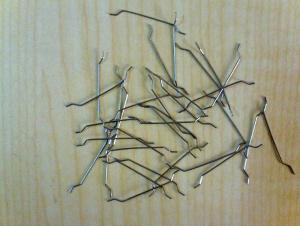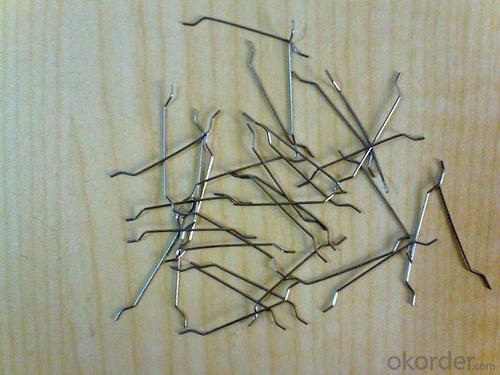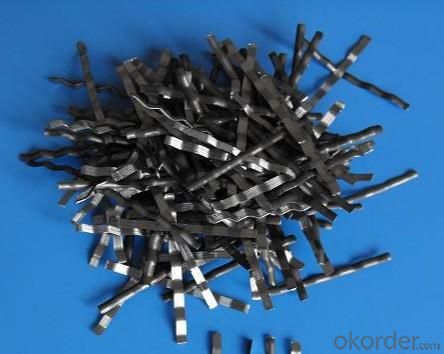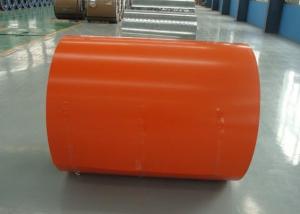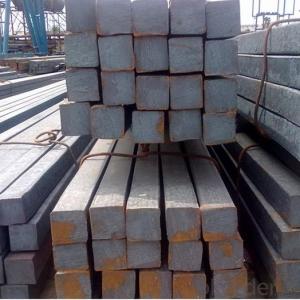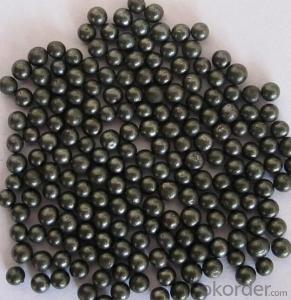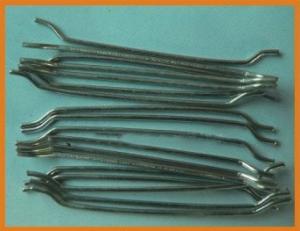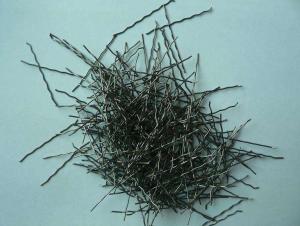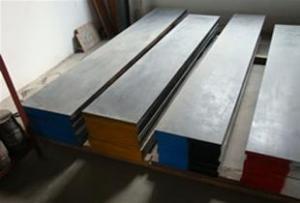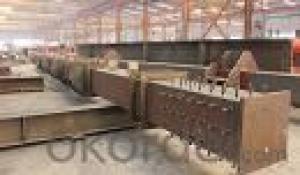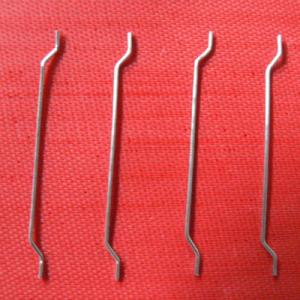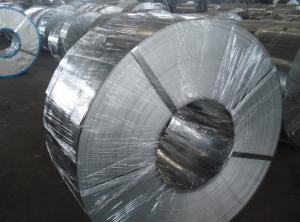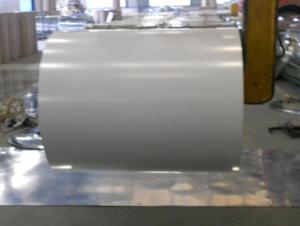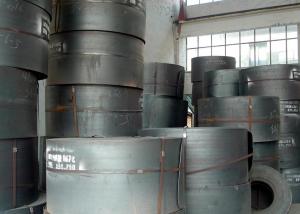Good Quality Steel Fiber
- Loading Port:
- Guangzhou Port
- Payment Terms:
- TT or L/C
- Min Order Qty:
- 5 Tons m.t.
- Supply Capability:
- 50000000 Tons Per Year m.t./month
OKorder Service Pledge
OKorder Financial Service
You Might Also Like
Technical Superiority of Good Quality Steel Fiber:
1. High in flexural strength, shear resistance & anti permeability.
2. Low in shrinkage degree, thus effectively preventing shrinkage cracks.
3. Excellent in ductility.
4. High in early strength times increase in impact resistance and fatigue resistance.
5. Good in workability,hence uniform distribution in concrete without balling during mixing and free from exposure after placing.
6.concrete thickness reduced without affecting its strength, hence a cut in concrete consumption by 20-30%.
7.rebar partly or completely omitted.
8.a small dosage with 0.35% as the smallest and 0.4-0.8 as normal range.
9.construction cycle shortened by 25%, suitable for projects where continuous and fast concrete placing is required, such as ports, airports, tunnels, reservoirs and industrial floors.
10.the same applied for conventional concrete mixing & placing without addition of other equipment.
Wave Steel Fiber(Mill Cut Steel Fiber)
Technological Specification of Good Quality Steel Fiber:
length:30-50mm
Tensile Strength: ≥700Mpa
Packing:20KG/Carton , 20KG/Bag , or according to your requirement.
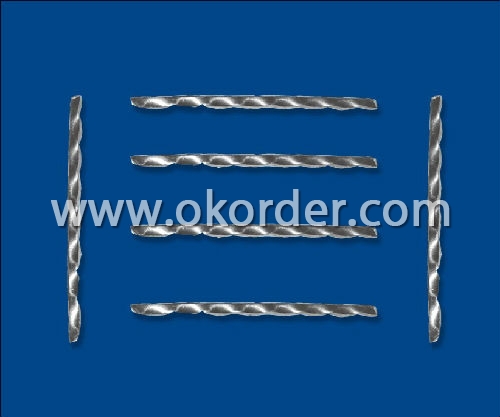
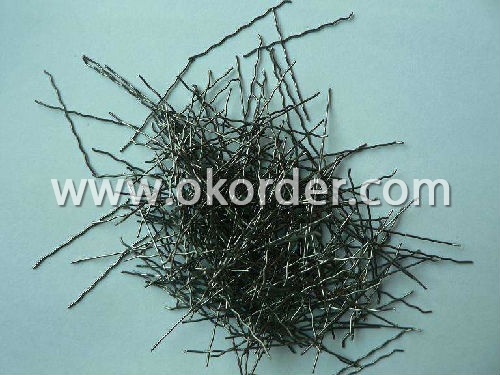
- Q: How is carbon steel different from stainless steel?
- Carbon steel and stainless steel differ primarily in their composition and properties. Carbon steel contains a higher amount of carbon, which makes it more susceptible to rust and corrosion. In contrast, stainless steel contains chromium and other alloys, making it more resistant to rust and corrosion. Stainless steel also has a higher tensile strength and is more durable, while carbon steel is generally cheaper and easier to shape and weld.
- Q: What are the uses of steel wire mesh in geotechnical engineering?
- Steel wire mesh is commonly used in geotechnical engineering for a variety of purposes. It can be employed to reinforce soil and prevent erosion, stabilize slopes and embankments, provide support for retaining walls, and improve the strength and stability of foundations. Additionally, steel wire mesh helps to control the movement of soil particles, enhances drainage capabilities, and acts as a barrier against the infiltration of unwanted materials. Overall, the use of steel wire mesh in geotechnical engineering contributes to the durability, safety, and long-term performance of various construction projects.
- Q: How do steel products contribute to the construction of theme parks and entertainment venues?
- Steel products contribute significantly to the construction of theme parks and entertainment venues in various ways. Firstly, steel is known for its strength and durability, making it an ideal material for constructing large structures such as roller coasters, Ferris wheels, and other thrill rides. Its ability to withstand heavy loads and extreme weather conditions ensures the safety and longevity of these attractions. Additionally, steel plays a crucial role in the construction of the framework and support systems of buildings within theme parks and entertainment venues. From the skeletal structure of indoor theaters and concert halls to the framework of outdoor stages and arenas, steel provides the necessary strength and stability to ensure the safety of performers, spectators, and equipment. Moreover, steel products are widely used in the fabrication of decorative and architectural elements found throughout theme parks and entertainment venues. From ornate entrance gates and signage to intricate sculptures and art installations, steel allows for intricate designs and shapes, adding aesthetic appeal and enhancing the overall experience for visitors. Overall, the versatility, strength, and durability of steel products make them essential in the construction of theme parks and entertainment venues, contributing to the safety, functionality, and visual appeal of these attractions.
- Q: What is the process of manufacturing steel products?
- The process of manufacturing steel products involves several steps. Firstly, iron ore is extracted from mines and then refined to remove impurities. The refined iron ore is then mixed with coke and limestone in a blast furnace, where it is heated to extreme temperatures. This process, known as smelting, converts the iron ore into liquid iron. The liquid iron is then poured into molds to create ingots or further processed into steel through various methods like oxygen blowing or electric arc furnace. The steel is then shaped and formed into desired products through processes such as rolling, forging, or casting. Finally, the steel products undergo finishing processes like heat treatment, surface coating, and quality inspections before they are ready for distribution and use in various industries.
- Q: How is steel used in the construction of shopping malls and retail centers?
- Steel is commonly used in the construction of shopping malls and retail centers due to its strength, durability, and versatility. It is used in various structural elements such as beams, columns, and frames, providing stability and support to the buildings. Steel is also used in the construction of roofs, walls, and facades, offering design flexibility and aesthetic appeal. Additionally, steel is often utilized in the construction of escalators, staircases, and elevators, ensuring efficient vertical transportation within these commercial spaces.
- Q: What are the properties of hardened steel?
- Hardened steel possesses several key properties including increased strength, durability, and resistance to wear and deformation. It exhibits a high level of toughness, making it suitable for withstanding heavy loads and impacts. Additionally, hardened steel has a higher resistance to corrosion, making it ideal for applications that require exposure to harsh environments.
- Q: How are steel plates used in the fabrication of storage tanks?
- Steel plates are used in the fabrication of storage tanks as they provide a strong and durable material that can withstand the pressure and weight of the stored contents. The plates are cut and welded together to form the tank's structure, ensuring a secure and leak-proof container for storing various substances such as liquids or gases.
- Q: What are the common uses of steel in the mining industry?
- Steel is commonly used in the mining industry for various applications such as structural support in mine shafts, equipment fabrication, and manufacturing of machinery and tools used in mining operations. It is also widely used in the construction of mining infrastructure like pipelines, storage tanks, and transportation vehicles due to its strength, durability, and resistance to corrosion.
- Q: What are the properties of corrosion-resistant steel for marine applications?
- Corrosion-resistant steel for marine applications possesses properties such as high levels of chromium and nickel, which provide excellent resistance to corrosion caused by saltwater exposure. It also has a protective oxide layer that forms on the surface, preventing further oxidation. Additionally, it exhibits high strength and durability, making it ideal for withstanding harsh marine environments.
- Q: How are steel sheets used in the manufacturing of industrial machinery?
- Steel sheets are used in the manufacturing of industrial machinery because of their high strength, durability, and versatility. They can be fabricated into various components such as frames, panels, and casings, providing structural support and protection. Steel sheets are also used for forming complex shapes through processes like bending, cutting, and welding. Additionally, they offer resistance to heat, corrosion, and wear, making them suitable for harsh industrial environments.
1. Manufacturer Overview
| Location | Tianjin, China |
| Year Established | 2001 |
| Annual Output Value | Above US$ 10 Million |
| Main Markets | 20.00% North America 15.00% South America 15.00% Eastern Europe 10.00% Southeast Asia 10.00% Northern Europe 10.00% South Asia 10.00% Western Europe 5.00% Africa 5.00% Mid East |
| Company Certifications | ISO9001:2000;ISO14001:2004 |
2. Manufacturer Certificates
| a) Certification Name | |
| Range | |
| Reference | |
| Validity Period |
3. Manufacturer Capability
| a) Trade Capacity | |
| Nearest Port | Tianjin Port |
| Export Percentage | 41% - 50% |
| No.of Employees in Trade Department | 6-10 People |
| Language Spoken: | English; Chinese; |
| b) Factory Information | |
| Factory Size: | Above 30,000 square meters |
| No. of Production Lines | Above 10 |
| Contract Manufacturing | Design Service Offered; Buyer Label Offered |
| Product Price Range | High; Average |
Send your message to us
Good Quality Steel Fiber
- Loading Port:
- Guangzhou Port
- Payment Terms:
- TT or L/C
- Min Order Qty:
- 5 Tons m.t.
- Supply Capability:
- 50000000 Tons Per Year m.t./month
OKorder Service Pledge
OKorder Financial Service
Similar products
Hot products
Hot Searches
Related keywords
